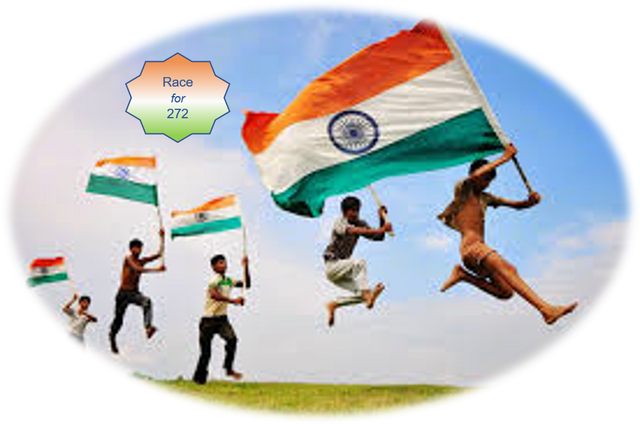
In this article, we will cover the election dynamics of two states. The states of Andhra Pradesh and Telangana. Section one of the article will analyze the political dynamics of Andhra Pradesh ending in the author's forecast for electoral wins for the BJP. In section two same will be done for the state of Telangana.
Before we get into analyzing the electoral dynamics and prospects for the two states, it will be in order to know and understand a bit of history for them. Prior to 2014, both these states comprised of one unified state. It was called Andhra Pradesh. The demand for a separate state for Telangana region had been pending for a long time. It was an unfinished task from the recommendations of the States Reorganization Commission (SRC) that was formed in 1953.
In wake of India's independence in August 1947 and the events that unfolded subsequently, the erstwhile Princely state of Hyderabad acceded to India. There were a total of some 500 plus princely states that had acceded to India due to efforts of Sardar Vallabh Bhai Patel. There was a need to merge and realign the states to create homogenous States that could be administered properly. The Government of India, in December 1953, appointed a commission (SRC as mentioned above) to look at the creation of states along linguistic lines. The SRC recommended that the Hyderabad state be split into three parts. The Marathi speaking part to be merged with Maharashtra. The Kannada speaking part to be merged with Karnataka. And the Telegu speaking part to be carried as a separate state for certain time during which the mood and sentiments of the people could be assessed and the decision taken to keep it as separate Telangana State or merge it with Andhra State. The Government of India accepted the first two recommendations but did not accept the third one – separate Telangana state. Instead in November 1956, this part of the erstwhile Hyderabad state – the Telegu speaking part – was merged with Andhra. Therein germinated the seeds for sperate Telangana State. See the map below.
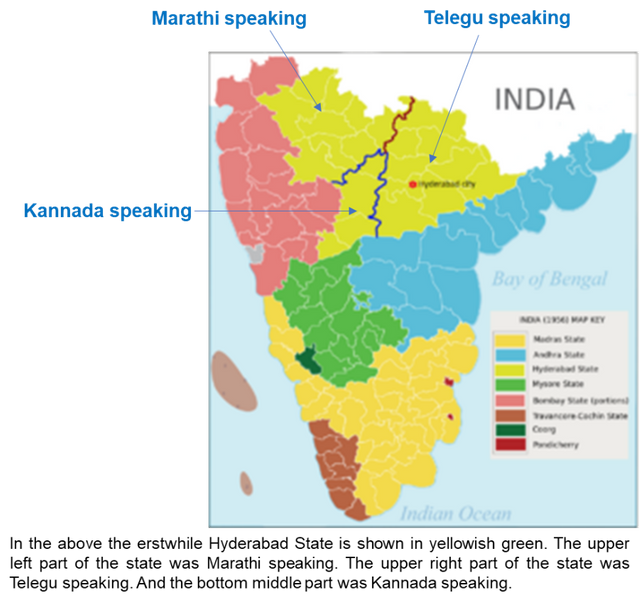
Since then the demand for a separate Telangana state has gone through a roller coaster ride – sometimes leading to agitations and sometimes almost going dead – until owing to a strange twist in circumstances K Chandrashekar Rao (KCR) upped the ante and raised the pitch for separate Telangana state once again in 2009. It so happened that the sitting Chief Minister Y S Rajshekhra Reddy (YSR) died in a helicopter crash in September 2009. Sensing the opportunity KCR went into overdrive to force the hands of the then central government over the issue of statehood. Under pressure the then home minister P Chidambaram actually announced on 9th December 2009 that government was initiating the process of creation of separate Telangana state. Massive protests erupted on the other side – people who were in favor of united Andhra. The government took a U-turn on 23rd December 2009 and withdrew the announcement. Unable to resolve the issue the central government went ahead and appointed a committee headed by a former Chief Justice, Judge B. N. Srikrishna, to look into the matter and come up with recommendations. The committee studied the issue and came up with a recommendation to maintain Andhra undivided and added a proviso to have an empowered Telangana Regional Council with adequate resources to look after the interests of Telangana region. The government however disregarded the recommendations. They went ahead and formed a separate Telangana state in February / March 2014 with an eye on the upcoming General Elections in April – May 2014. The decision backfired on the then ruling Congress party severely. Congress party got almost completely wiped out from not just Andhra but also from the new Telangana State. Congress had 33 seats (out of 42 seats in unified Andhra) in 2009 elections. The Congress party got reduced to just 2 seats in Telangana and was totally wiped out from Andhra. On the other hand, the regional parties got lions share of seats. Telegu Desam Party (TDP) went up to 16 seats from 6, Telangana Rashtra Samiti (TRS) went up to 11 from 2, and even the newly formed regional party YSR Congress Party (YSRC) got 9 seats.
With this historical backdrop, we now move on to analyze Andhra and Telangana prospects for the upcoming 2019 General Elections.
Section One – Andhra Pradesh
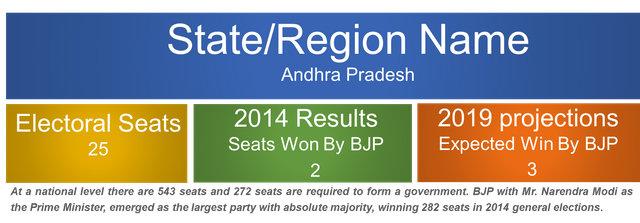
The picture below gives you the geographical location of the state on the Map of India. It also gives an overview of the state in terms of macro-level economic, political and electoral data.
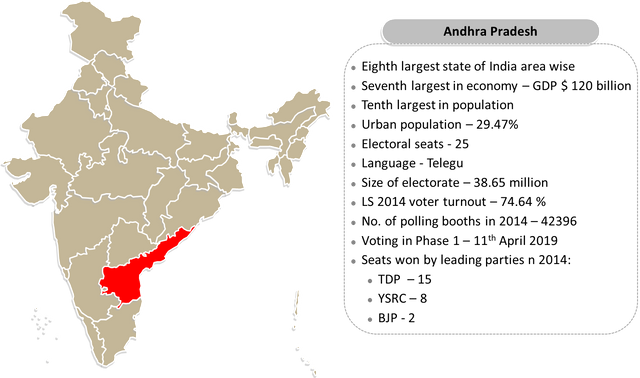
As mentioned in the boxed data above, Andhra is going to polls in Phase 1 of the 7 phase General elections. The polling date is 11th April 2019. The elections will be simultaneously held for the Parliamentary Constituencies (Lok Sabha) as well as for the Assembly constituencies (State Government). We are presenting the analysis for Parliamentary Constituencies only.
The battle in Andhra Pradesh is primarily between TDP and YSRC (YSR Congress) – the two regional parties. The TDP party was part of the ruling coalition at the Centre since 2014. They are also the party in power in Andhra assembly. However, about a year and a half back, in a deft move, YSRC lead by Jagan Reddy cleverly upstaged the vastly more experienced Chandra Babu Naidu of TDP. Jagan publicly put Naidu on the defensive by castigating him for not bringing in enough pressure on Central government to grant ‘Special Category Status’ to State of Andhra Pradesh in wake of the bifurcation of the state in 2014. Strangely Chandra Babu Naidu fell for the bait and got entrapped in it though he is an experienced politician. He became defensive and responded by raising the issue in Parliament and tried in vain to bring pressure on the central government to grant the status. That the central government could not have done so was known to Naidu as well as Jagan as the 15th Finance Commission had clearly ruled against it. Naidu’s TDP even walked out of the NDA coalition as a part of a strategy to woo Andhraites with an eye on the ucoming Assembly elections. They went to the extreme and even tried to bring down the government at the center by moving a ‘No Confidence Motion’ against the central government joining hands with Congress and other opposition parties. The motion was defeated easily in the Parliament. While Jagan got the credit for raising the issue initially, no credit came Naidu’s way for bringing in No Confidence Motion.
It is extremely surprising that Naidu was totally outsmarted and outwitted by Jagan, a rookie in politics. One is sure his father YSR, the ex-Chief Minister of combined Andhra must be smiling in heaven. As a result of all these antics by Naidu the YSR Congress has gained considerable ground. Who wins the Assembly elections is more or less a toss up. But the fact is that Jagan from nowhere has more or less come center stage. And can not be ruled out as contender for winning Assembly elections.
BJP in the meanwhile has neither lost much on account of the controversy nor gained much. The central government had in fact done justice to Andhra in terms of providing an equivalent amount of funds as would have been due to Andhra through the Special Category Status. In fact during the phase when all this controversy was going on the central government acquitted itself very well by not only making this fact known loud and clear, they also went a step further in saying that funds would not be a bottleneck for Andhra for their legitimate development needs including building a new Capital for State of Andhra Pradesh as required under bifurcation arrangement. After the defeat of ‘No Confidence Motion', the government at the center slammed Naidu for not having performed to the expectation of people in the State despite full support by Central government. Notwithstanding the bitter criticism of Modi and central government by Naidu, BJP will gain due to a common thread of development. BJP has done tremendous work towards implementing the various schemes for the welfare of the poor and weaker sections of the society. The following visual gives the benefits accruing on four of the flagship welfare schemes.
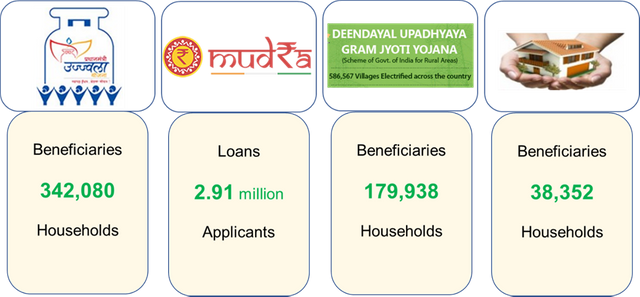
In our assessment BJP may gain marginally in Andhra vis a vis 2014 elections. They may get three seats instead of two seats in 2014.
Section Two – Telangana
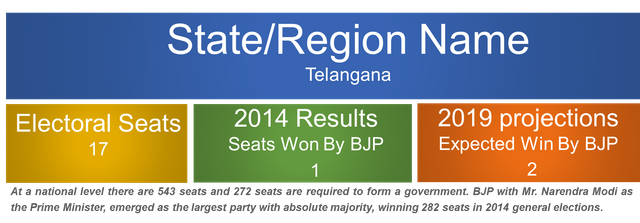
The picture below gives you the geographical location of the state on the Map of India. It also gives an overview of the state in terms of macro-level economic, political and electoral data.
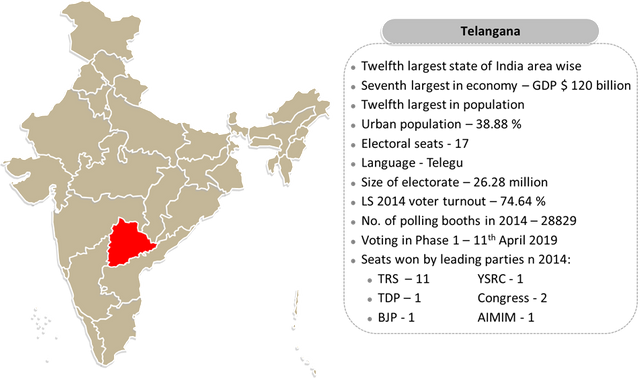
The State of Telangana is also going to polls in Phase 1 on 11th April 2019. The assembly elections were smartly delinked by conducting them ahead of schedule in Nov / Dec 2018 itself by KCR. It is widely accepted that TRS the leading party in the state maintains a strong grip on the state. Just about four months back they have won a landslide victory in assembly elections improving their tally to 87 seats from 63 seats in 2014 in a 111 seat assembly. It will remain to be the dominant party in Lok Sabha elections also. However, the segregation of state and lok sabha elections will afford an opportunity to the electorate to distinguish between state and national issues and focus on the national issues in the Lok Sabha elections. This will be a little more pronounced in urban areas and Telangana has a 39% urban population. This fact, coupled with the excellent performance of Modi government reaching the bottom half of the Indian population through implementation of their various schemes, will enable BJP to get a higher number of seats. In all probability at the expense of TDP and Congress. Some of the benefits that have accrued to the people of Telangana from schemes operated by Central Government are as per graphic below.
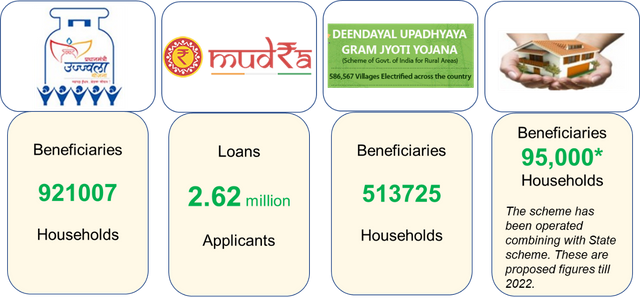
We expect BJP to raise their tally to 2 seats in the state from the current position of only one seat.
The running position with this article totals up to as below:

@milansarmah @mbp @s4s @ajain @scj @onende @iginsotra @tonde8 @rillechi @erara9 @tusowea @tengar @surirt @ogerado @ofugato @yowoolfe @atongare @cutoplecua @neroplume @feapo
A reminder - if you have liked the article do upvote us. Please also feel free to comment on the article. We welcome relevant discussions and opinions.